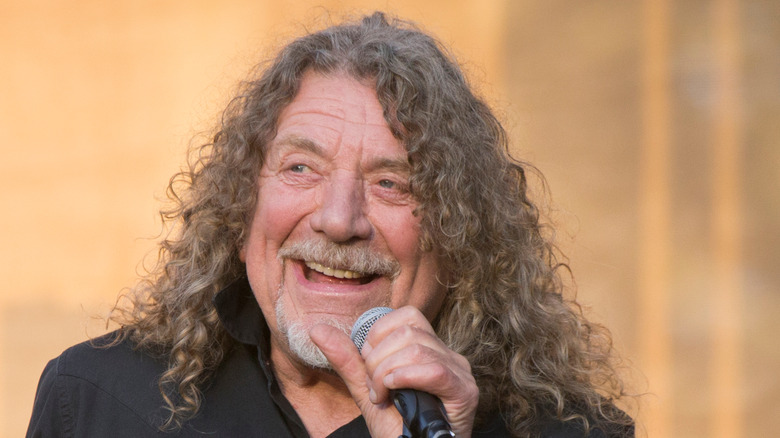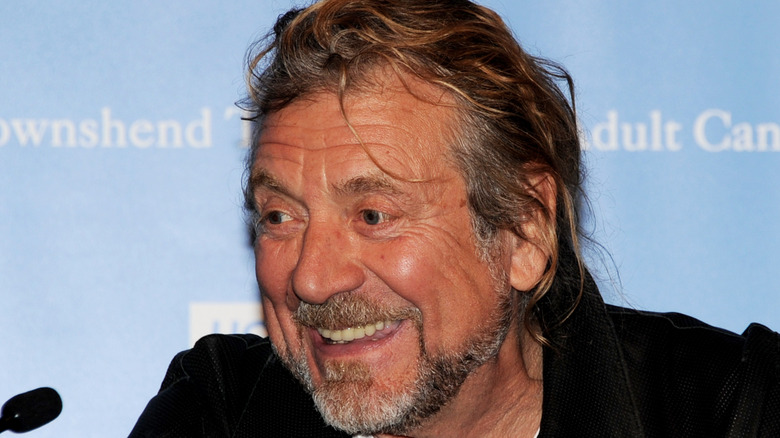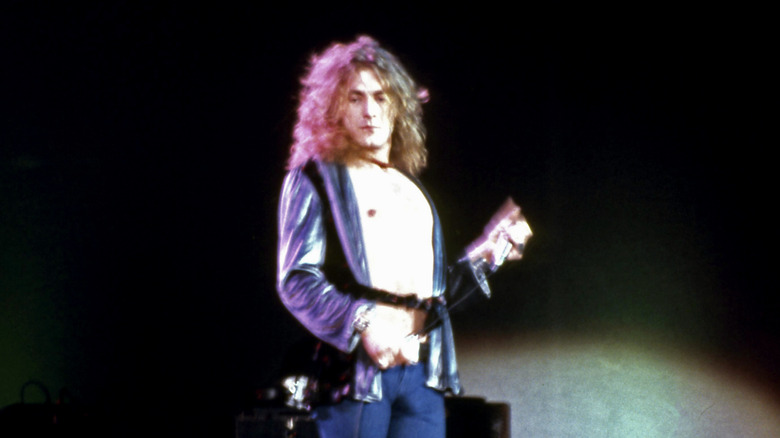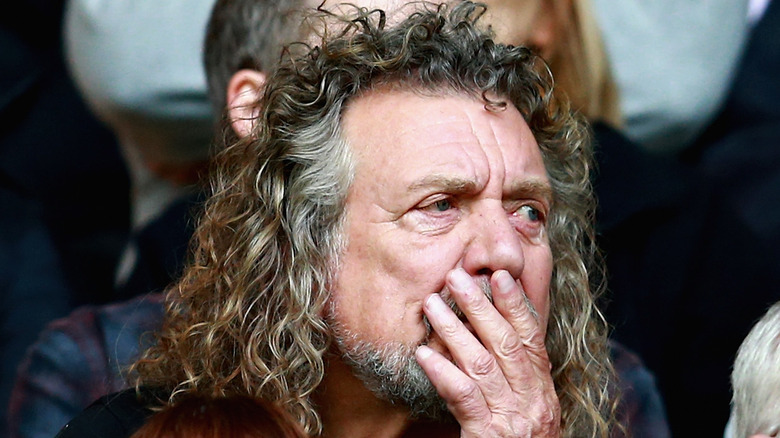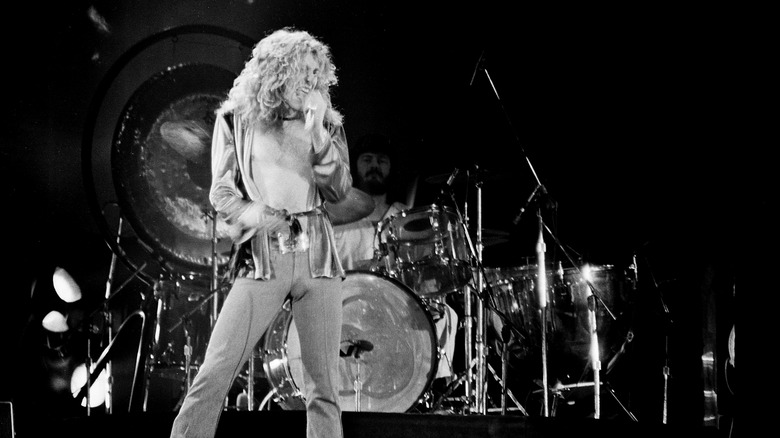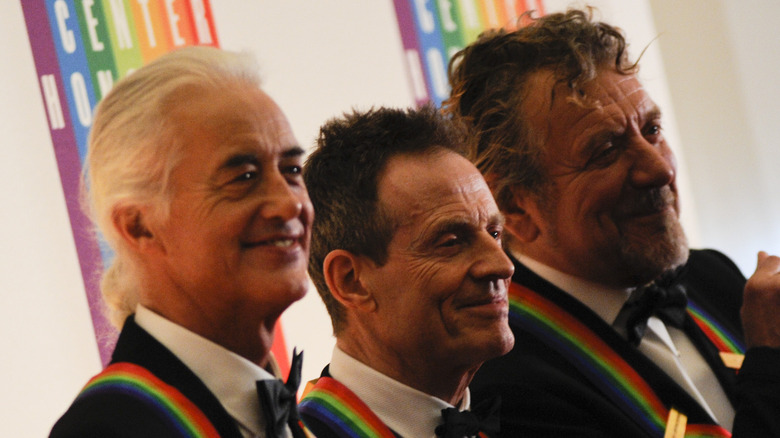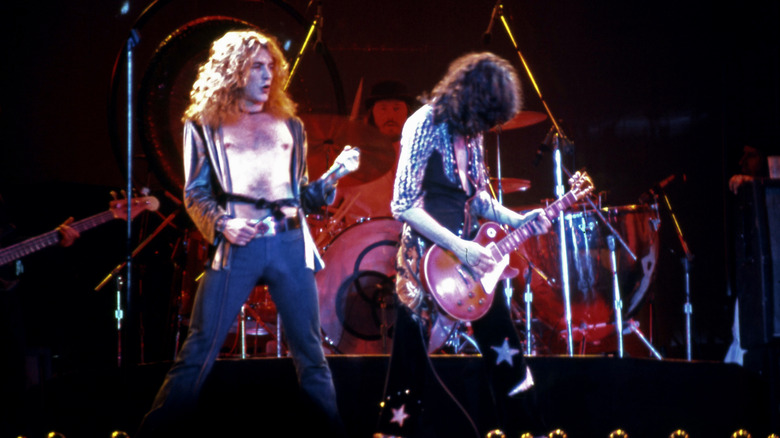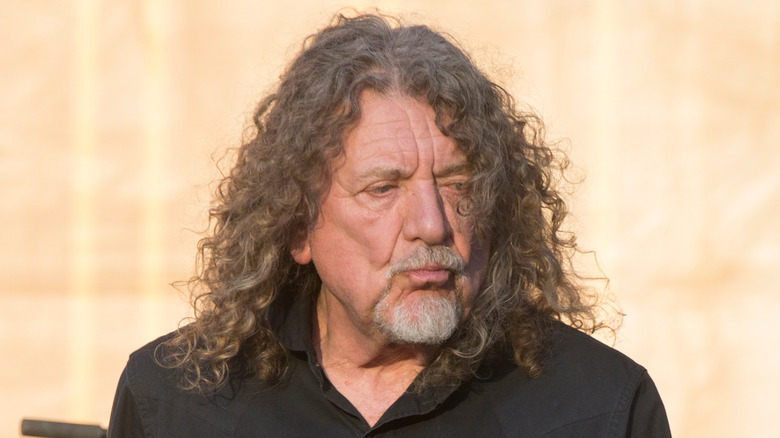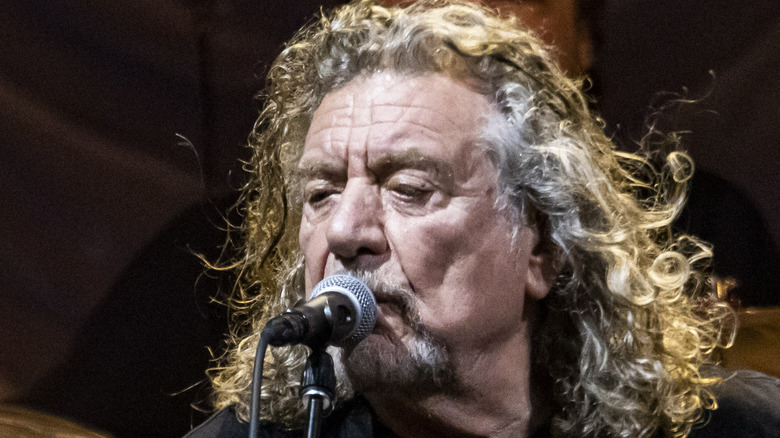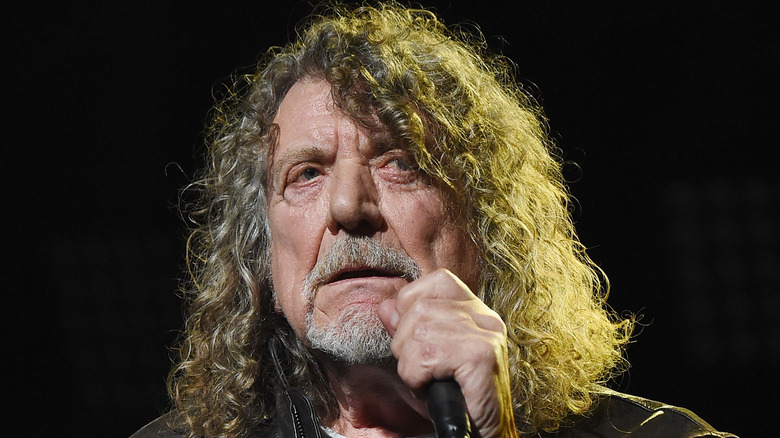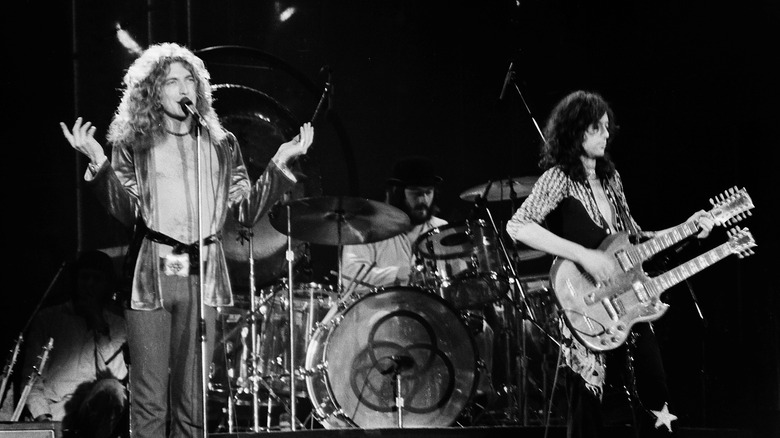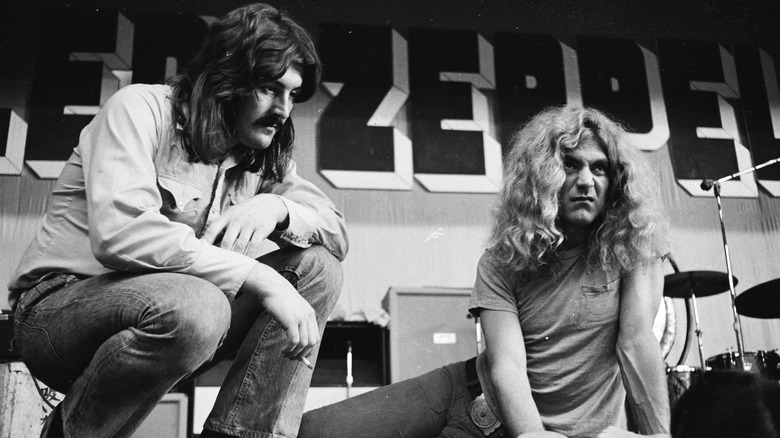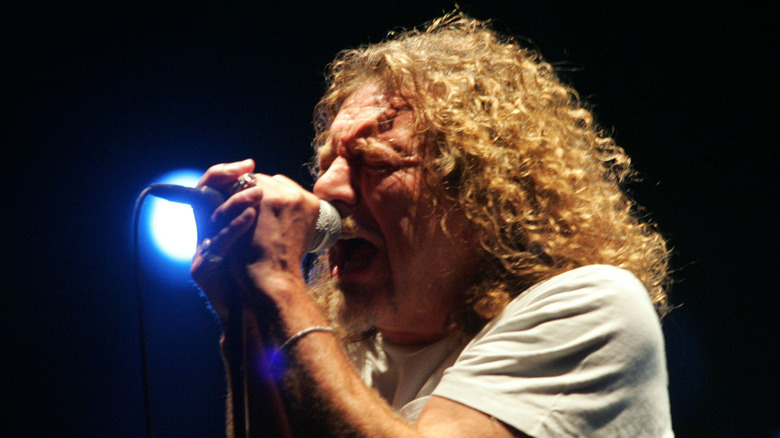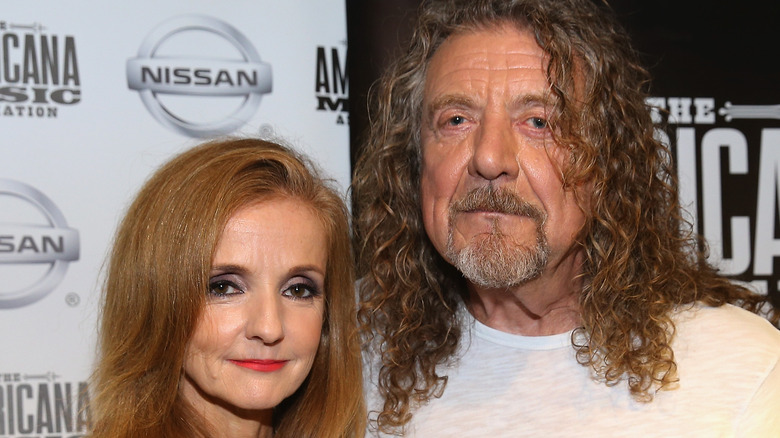The Untold Truth Of Robert Plant
In late 1968, The New Yardbirds decided to change their name to Led Zeppelin as a joke — some musicians thought they would "go down like a lead balloon," reports Rolling Stone. But when seasoned musicians Jimmy Page and John Paul Jones joined forces with Robert Plant (and his friend, drummer John Bonham) that year (via AllMusic), Led Zeppelin became a force to be reckoned with, in the United Kingdom and the United States alike. They had seven Billboard no.1 albums, with their second album, "Led Zeppelin II," topping the list for seven weeks (via Music Times).
From the feral "Whole Lotta Love" to the meditative "Stairway to Heaven," Led Zeppelin have brought hugely inspiring and influential tunes to the rock 'n' roll world. And none of these songs would have been the same without the powerful voice and captivating lyrics of Robert Plant. Rolling Stone once declared Plant the best lead singer of all time, and as DW reports, his stage presence was one of the first that said "rock god." Here is the untold truth of Robert Plant.
He had a happy childhood
As biographer Paul Rees reports in "Robert Plant: A Life," Robert Plant was born on August 20, 1948, in the "Black Country" — the industrial area around Birmingham that was known for its heavily polluted air. And during the early 1950s, this area was still greatly affected by the World War II bombings. But Plant remembers a pleasant childhood, and this is in great part thanks to his mother, Annie Celia Plant.
According to Plant himself (speaking to BBC's Desert Island Discs), Annie was "suitably and joyfully combustible," and she would always sing and dance around the house, spreading her joy to everyone around her. Robert Plant's father, also called Robert, could play the violin, but he had given up his passion in order to provide for the family — so it was Annie's joy, musicality, and creativity that deeply inspired the young Robert. Annie's Romani heritage played a part in her character, and the Led Zeppelin singer was very happy to inherit this — this and her amazing curly hair. Robert Plant once told GQ, "My mother ... her hair was very, very thick — she couldn't even get a brush through it."
His father wanted him to be an accountant
Robert Plant's father was a civil engineer who had served in the Royal Air Force during the war, as per "Robert Plant: A Life," by Paul Rees. Although he imbued his son with a love of cycling (and of the football team Wolverhampton Wanderers, which Plant supports to this day, as per The Guardian), Robert Plant Sr. was a pretty conservative man who didn't accept his son's artistic inclinations. During an interview with the BBC's 2Desert Island Discs, the singer commented that his father was of the generation that would ask, "'What do you do?' and I'd say 'Well, you know, I sing.' And they'd say, 'Yeah, but I mean, what do you do?'" Playing music simply wasn't a suitable job in his father's mind, so he had a different plan for Robert: accountancy.
Indeed, young Robert was pushed to become an accountant in the early 1960s. And as it took a while for him to make money out of music, he did start an undergraduate program in finance and accounting on a scholarship at the London School of Economics, as Exechunter reports. He soon dropped out, but he did retain some skills that helped Led Zeppelin save tremendous amounts of money on their tours (for example, he once suggested renting a jet and sleeping on it rather than paying for hundreds of hotel rooms).
He left home to avoid arguments with his parents
According to Paul Rees in "Robert Plant: A Life," Robert Plant would sing Elvis Presley into his hairbrush when he was 9 years old. He spent his teenage years living close to Stourbridge, and his father would take him to the town's blues club, Seven Stars (via The Guardian). That's where Plant would cut his teeth with house band, the Delta Blues Band.
But the more time he spent at the blues bar, the less time he would spend at school. Needless to say, this behavior started a conflict within his family, as Plant's parents were afraid he would give up a solid career for a wild goose chase. As he confessed to The Guardian, "I was at school at the time, and it was really hard to combine the two and keep a compatible relationship with schoolmasters and parents at the same time as doing what I really wanted to do." When he joined a band called the Crawling King Snakes, this deeply upset his parents, and their relationship grew cold for a while.
While Plant managed to scrape by with barely passing grades for his final exams, as the story goes, he was allegedly expelled due to truancy. So, at 17, Plant left home. But as he told Louder, "Well, I was bound for a proper job, and I've got one... I made my peace with my parents a couple of years later."
He had his big break in 1963
In 1963, 15-year-old Robert Plant's friends and schoolmates were part of a band called The Jurymen. According to Jurymen guitarist Gary Tolley (via "Robert Plant: A Life," by Paul Rees), Plant latched on to them, even carrying their gear but never singing with them. One day, their singer, Andy Long, got sick: "The gig was on, so they said, 'You know the songs. Get up and let's do the gig'" (via BBC's Desert Island Discs). So Plant climbed up on the tiny stage at the Bull's Head Pub in Lye, and he sang.
You might ask how the concert went, but there are two diverging stories. For Plant, the whole experience was very intimidating: "I was very nervous and didn't look at the audience at all ... Not until about 1968." However, as "Robert Plant: A Life" reports, Jurymen drummer John Dudley remembers Plant's first concert differently: "When he got up there, he was full of it –- absolutely full of confidence." While it might have felt differently inside Plant's mind, his powerful voice had a great effect on the crowd, and soon enough, he was playing with various local bands.
Working with Jimmy Page and John Paul Jones was initially intimidating
By the late 1960s, both Jimmy Page and John Paul Jones were truly seasoned musicians — as per Rolling Stone, by 1967, Jones had recorded music with Donovan and Jeff Beck and had created the famous string arrangement for The Rolling Stones' "She's a Rainbow." They were playing as The Yardbirds, but in 1968, they lost their vocalist. Page thus began a thorough search for the perfect lead singer throughout the U.K.
As Observer reports, Page's first option was Terry Reid, a powerful singer who was appreciated by several musicians at the time, including Aretha Franklin. Reid asked Page to wait for him a few weeks, as he was just touring with The Doors and Jefferson Airplane. However, Page didn't want to wait, so Reid recommended Robert Plant to Page (Plant had once opened for Reid's show). In Reid's arguably frustrated words, "It's a waste of time to talk about it. They did really well. End of story."
But joining The Yardbirds was a daunting experience for young Plant (via BBC's Desert Island Discs): "We were suddenly alongside John Paul Jones and Jimmy Page who were really, seriously accomplished, far more mature ... I was really kind of intimidated." Plant believes he only became a confident singer around 1970-1971.
Led Zeppelin's first concert was on Robert Plant's wedding day
In 1966, Robert Plant met Maureen Wilson at a canceled Georgie Fame concert (via Rocks Off Magazine). Unlike many other cases, it was Wilson who supported Plant throughout the first two years of their relationship. Hers was a hard-working family, and her dad owned a steel factory — Plant ended up working at the factory for a short time while trying to make it as a musician. Wilson also worked as a nurse at the time, and she provided most of the couple's funds — at least until Plant joined The Yardbirds.
In late 1968, The New Yardbirds would start playing under the Led Zeppelin name, as Rolling Stone reports. The first Led Zeppelin concert took place at the London Roundhouse on November 9. Right after their concert, Plant married Wilson at the same venue. The couple would go on to have three children, Carmen, Karac, and Logan, and Wilson usually stayed behind with them at the couple's farmhouse while Plant was away touring.
He has a history of horrific car crashes
When Led Zeppelin were accused of stealing the opening guitar riff from Spirit's "Taurus" and using it in their 1971 hit "Stairway to Heaven," Robert Plant said he didn't remember ever seeing Spirit play. As The Irish Times reports, he had lost a big part of his recent memory in a 1970 car crash: "I don't have a recollection of mostly anyone I've met ... Part of the windshield buried in the top of my head, which was interesting."
And it would get even worse. On August 4, 1975, Robert, Maureen Plant, their two older children and Jimmy Page's daughter, Scarlet, were vacationing on the Greek island of Rhodes when they crashed their rented car into a tree (via Louder). Robert shattered his right leg and elbow, and Maureen had a broken skull, fractured pelvis, and was bleeding profusely. The only person without any broken bones was little Scarlet Page. Through nothing short of a miracle, Maureen was saved — Led Zeppelin's tour manager managed to fly them to Guy's Hospital in London, where she was able to receive the proper care. Robert himself was in a large cast for months, as he remembers in a BBC interview, and he recorded the 1976 album "Presence" from his wheelchair. The opus song "Achilles' Last Stand" was even titled "The Wheelchair Song" initially.
Robert Plant lost his son
In 1977, Led Zeppelin were touring in the U.S. This was their darkest tour yet: Robert Plant's car crash had caused several setbacks, and the tour was ridden with violence and small riots, as Ultimate Classic Rock reports. But on July 26, the very worst would happen. First, Robert received a call that his 5-year-old son, Karac Plant, was sick — he had contracted a stomach virus that Maureen Plant had just gotten over. Later that day, he received another call: Karac had passed away. Led Zeppelin's tour was immediately canceled, and Robert's father explained at the time, "Karac was the apple of Robert's eye; they idolized one another," as per the Associated Press (via Led Zeppelin's website).
Robert retreated to the family's farmhouse, "gathered what was left of the shards of the family and tried to put it together" (via TBBC's Desert Island Discs). At that point, he didn't want anything to do with music anymore. He told Charlie Rose in 2012: "There are priorities in life, beyond being an entertainer." And he said it even more clearly to Rolling Stone: "I lost my boy. I didn't want to be in Led Zeppelin. I wanted to be with my family." It would take John Bonham's persuasiveness to change his mind.
He considered teaching
After his son's death, Robert Plant considered changing his career in order to do something more meaningful and less-egocentric. As he told GQ in 2011, "I just thought there was something far more honest and wholesome about just digging in and putting the ego away in the closet. Because no matter what we say, entertainers are usually quite insecure, wobbly characters underneath." His solution? Apply to be a teacher at the Rudolf Steiner Waldorf schools in the West Midlands.
As he describes in the BBC's Desert Island Discs, one day, Plant made his way to the Waldorf Education Center when he found John Bonham waiting for him at the gate. Bonham practically forced Plant into his six-door Mercedes, wearing a chauffeur's cap "so that he could never get nicked on the way home," and drove him to a pub to change his mind about leaving music. Needless to say, Plant was inspired by Bonham and decided to stick with Led Zeppelin for the time being.
He is deeply inspired by Indian and Moroccan music
Robert Plant has had a lifelong passion for Indian culture and music, and this passion later spread out to Northern Africa as well. One of his favorite musicians is Mohammed Rafi, as he associates him with the time he was good friends with a Gujarati family that lived next door to wife Maureen Plant's family and dropping by unannounced just to enjoy their food and music (via BBC's Desert Island Discs). According to Huffpost, Robert would go on to record music with Jimmy Page in Bombay (now Mumbai) in 1972. The pair played with classical musicians Ustad Sultan Khan and Pt Vijay Raghav Rao — this was just the beginning of their love for exploring non-Western music.
In 1994, Robert Plant and Jimmy Page reunited, as per Louder, (although not under the Led Zeppelin name, as John Paul Jones was not present) for a musical project called "No Quarter." A large chunk of it was filmed in Morocco (Plant and Page also filmed themselves playing with local musicians in the old city square in Marrakesh), and North African sounds can be heard throughout the live album (with a particularly Indian version of "Kashmir" ending the songlist). Arabic and Oriental influences can also be heard on most of Robert Plant's solo albums, such as "Mighty Rearranger" or "Carry Fire."
John Bonham's death was the end of Led Zeppelin for Robert Plant
Robert Plant had known John Bonham since high school — they were two "Black Country" boys with musical aspirations (via Stourbridge News), and they never left each other's side until Bonham's untimely death in September 1980: "I drove down with him on the day of the rehearsal and I drove back without him" (via BBC's Desert Island Discs). According to Ultimate Classic Rock, Led Zeppelin were rehearsing for their first tour since 1977, but John's alcohol abuse had reached an all-time low. On the day of his death, he had consumed 40 units of vodka.
John Paul Jones, who found his bandmate, said, "I can't say he was in good shape, because he wasn't. There were some good moments during the last rehearsals ... but then he started on the vodka ... But he died because of an accident. He was lying down the wrong way, which could have happened to anybody who drank a lot" ( via "John Bonham: A Thunder of Drums," by Chris Welch and Geoff Nicholls).
The news was absolutely devastating for Plant. It was clear for him: There could be no Led Zeppelin without John Bonham. As Billboard reports, after Bonham's son, Jason Bonham, played on the only Led Zeppelin reunion (the 2007 "Celebration Day" concert in London), he asked Plant whether Led Zeppelin would get together again. Plant said, "I loved your dad way too much."
If you or anyone you know is struggling with addiction issues, help is available. Visit the Substance Abuse and Mental Health Services Administration website or contact SAMHSA's National Helpline at 1-800-662-HELP (4357).
He had a few problems with his voice
Every Led Zeppelin fan recognizes Robert Plant for his unique scream and impressive vocal range, but the musician's vocal cords were in grave danger at least twice. As the New York Post confirms, Plant had surgery to remove vocal cord nodules — while the date of the surgery is unknown, Society of Rock argues that it was probably between late 1972 and early 1973, as Plant's vocal quality seemed to increase drastically.
While the 1970s surgery seemed to bring only good news to Plant, the early 1990s brought a real scare to the musician, as he told Dan Rather (via Alternative Nation): "One time I went to see a voice specialist in London on Harley Street ... He had a dish on his head, and he put a camera down my throat and he said: 'In six months' time, your voice won't even be able to show signs of surprise. It's over.'" Plant was told this was the end of his career as a rockstar. While professional singing is indeed very strenuous work for one's throat and vocal cords, several singers have undergone surgery and made a good recovery, Elton John and Steven Tyler included (via Page Six). Robert Plant was confident he would, too, and he did — he went on to release several records after the doctor's terrifying news in the 1990s.
He and Patty Griffin dated
In 2010, Robert Plant started dating musician Patty Griffin, after collaborating with her in his project "Band of Joy," as per NOVA. As Ultimate Classic Rock reports, the two were an instant match on a personal and professional level. Plant had been living in the U.S, for a while, and when his relationship with Griffin got serious, the two moved to Austin, Texas (via the Independent). Griffin was a big inspiration for Plant's more recent musical style, as he confirmed with Louder: "And she's so prolific and such a soulful cat that I thought, this is it. This is the whole deal of what it's all about -– musical integrity, great company and stimulus."
But in 2014, the couple split, and Plant made a big decision: He would return to his home country (via Rolling Stone). Eventually, the return inspired his album "Lullaby and ... The Ceaseless Roar," as per Rolling Stone. "To come back to the Welsh borders and to the hills and the valleys and the friends and confidants, it's been something I didn't imagine when I was out there in Mississippi and Texas ... These songs are an ode to life and love and the fragile adventure you set out upon unknowingly and unwittingly," he said.
